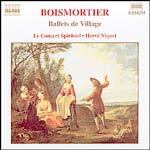
Boismortier - Ballets de Village
 $25.00
Low Stock
add to cart
$25.00
Low Stock
add to cart
JOSEPH BODIN de BOISMORTIER
Boismortier - Ballets de Village
Le Concert Spirituel, Herve Niquet, conductor
[ Naxos / CD ]
Release Date: Tuesday 15 January 2002
Should this item be out of stock at the time of your order, we would expect to be able to supply it to you within 2 - 5 business days.
"These ballets are delightfully un-serious stuff."
"There are getting to be a number of Boismortier recordings in the catalog, thanks in part to the efforts of groups like Le Concert Spirituel."
"After a hiatus of nearly 200 years, Le Concert Spirituel was revived in 1988 under the direction of Herve Niquet, with the same purpose as its predecessor and also to promote the music of lesser known composers.
"These ballets are delightfully un-serious stuff. In Boismortier's time, human nature was apparently the same as it is now: people wanted to hear simple, familiar music."
"This program gives us an excellent sampling of what people gave him money for: joyous, uncomplicated music for performance on rustic instruments such as the musette and the hurdy-gurdy. The four Ballets de Village contain a good share of the major pieces ever composed for musette and vielle, and Boismortier makes expert use of them indeed. Included here also is lengthy Serenade, with many small movements such as airs, gavottes, gigues, and minuets. Most of Boismortier's recorded music consists of sonatas, suites, and music for harpsichord, with a few vocal pieces thrown in; it is good to have recordings of these four short ballets and the Serenade. This is very enjoyable music and well worth hearing."
"I suggest this lively program if you have trouble waking up in the morning. Or it would be the perfect accompaniment to a light repast of Sauternes and Brie, with crackers and fruit and conversation with friends. All is expertly performed by this excellent ensemble; the sound is great, and notes are good."
- American Record Guide (Ardella Crawford), September-October, 2000
Joseph Bodin de Boismortier was born in France in 1689, and became one of the first composers whose income totally depended upon his ability to provide a constant flow of new works. He had no patrons, few of his scores were commissioned, and in his mature life he never appeared as an instrumental musician. Yet he was so prolific, and his music so frequently performed, that he became a very wealthy person. Though he brought to music many new ideas, principally in the use of the combination of instruments he employed, his work concentrated on the production of popular classics of the day. His group of divertissements, Ballets de Village, was composed in 1734, and displays the composer's ability to please the listener with simple charms.
Tracks:
Premier ballet Op.52
01. Premier ballet, Op. 52 08:56
Cinquieme gentillesse Op.45
02. Gaiement 02:22
03. Gracieusement 01:42
04. Gaiment 02:42
Premier ballet Op.52
05. Deuxieme ballet, Op. 52 08:57
Premiere serenade ou premiere simphonie francoise Op.39
06. Ouverture 03:24
07. Entree rustique 01:14
08. Air gracieux 01:44
09. Gavotte en rondeau 00:51
10. Choeur imaginaire 03:05
11. Rigaudon et deuxieme rigaudon 01:27
12. Rondeau 01:54
13. Menuet et deuxieme menuet 01:56
14. Gavotte 00:49
15. Sarabande 01:55
16. Air vif 01:09
17. Air modere 01:47
18. Gigue 01:13
19. Villageoise et deuxieme villageoise 01:47
20. Musette 01:57
21. Les reverences nuptiales 01:47
22. Loure 01:05
23. Chaconne 04:11
Troisieme ballet Op.52
24. Troisieme ballet, Op. 52 07:45
Quatrieme ballet Op.52
25. Quatrieme ballet, Op. 52 09:03
